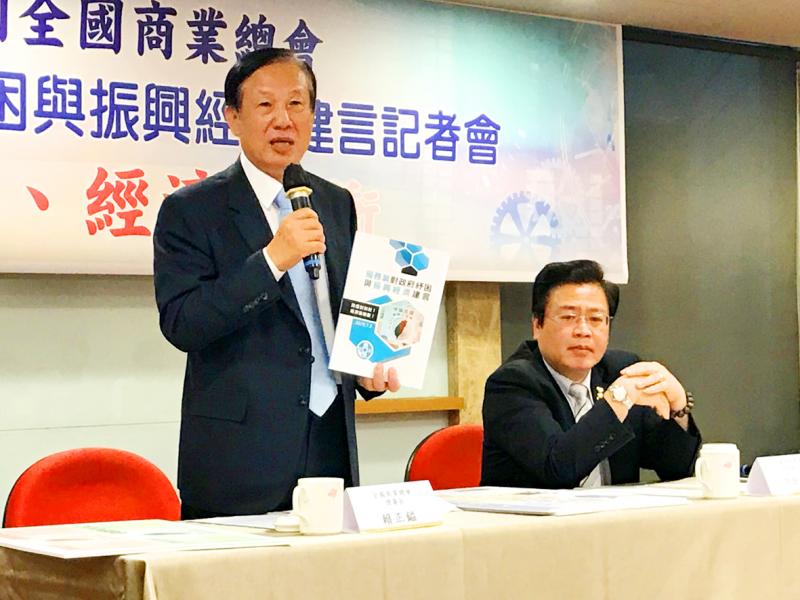The government should extend relief programs by another three months for all businesses other than urban hotels and travel agencies that continue to struggle due to the nation’s border controls, the General Chamber of Commerce (全國商業總會) said yesterday.
Chamber chairman Lai Cheng-yi (賴正鎰), who owns Taichung-based Shining Group (鄉林集團) and the luxury hotel brand The Lalu (涵碧樓), said that gift shops, pet boarding facilities, tour bus companies, movie theaters and trade show organizers have failed to benefit from an ongoing boom in dining and domestic travel.
“They would have no choice but to shut down if the government keeps border controls and ends wage subsidies,” Lai told a news conference in Taipei.

Photo: Lee Ya-wen, Taipei Times
Those companies depend heavily on international tourist arrivals and authorities should not cut them off while planning to shore up urban hotels and travel agencies, he said.
Revenue has dried up for trade show organizers, while movie theaters have seen their income plunge by 90 percent due to a lack of supply of new films from abroad, Lai said.
The chamber thanked the government for its assistance in the previous three months through low-interest loans and wage subsidies that expired at the end of last month.
However, it is too early to pull the plug, as the government continues to ban foreign tourist arrivals and locals from traveling abroad, Lai said.
The unemployment rate is very likely to spike if authorities slam the brakes on the relief program without introducing supporting measures, the chamber said.
Service providers hire more workers in Taiwan than manufacturing companies, which appear to command more attention from policymakers, Lai said.
It is time the government adopts a balanced economic development approach that would take care of all, he added.
“A balanced approach is urgent and critical as the virus outbreak is reshaping people’s behavior... Some jobs might be lost forever and policy directions are badly needed to help companies transform and survive,” Lai said.
All government agencies should be involved in this mission, instead of being limited to transportation and economic officials, the chamber said.
Taiwan should raise its tolerance level and ease restrictions on inbound travelers on the condition that it would not strain the public health system, Lai said.
South Korea and China have granted business travelers speedy passes on a reciprocal basis and Taiwan should seek a similar arrangement given its close economic links with China, he added.

In Italy’s storied gold-making hubs, jewelers are reworking their designs to trim gold content as they race to blunt the effect of record prices and appeal to shoppers watching their budgets. Gold prices hit a record high on Thursday, surging near US$5,600 an ounce, more than double a year ago as geopolitical concerns and jitters over trade pushed investors toward the safe-haven asset. The rally is putting undue pressure on small artisans as they face mounting demands from customers, including international brands, to produce cheaper items, from signature pieces to wedding rings, according to interviews with four independent jewelers in Italy’s main

Japanese Prime Minister Sanae Takaichi has talked up the benefits of a weaker yen in a campaign speech, adopting a tone at odds with her finance ministry, which has refused to rule out any options to counter excessive foreign exchange volatility. Takaichi later softened her stance, saying she did not have a preference for the yen’s direction. “People say the weak yen is bad right now, but for export industries, it’s a major opportunity,” Takaichi said on Saturday at a rally for Liberal Democratic Party candidate Daishiro Yamagiwa in Kanagawa Prefecture ahead of a snap election on Sunday. “Whether it’s selling food or

CONCERNS: Tech companies investing in AI businesses that purchase their products have raised questions among investors that they are artificially propping up demand Nvidia Corp chief executive officer Jensen Huang (黃仁勳) on Saturday said that the company would be participating in OpenAI’s latest funding round, describing it as potentially “the largest investment we’ve ever made.” “We will invest a great deal of money,” Huang told reporters while visiting Taipei. “I believe in OpenAI. The work that they do is incredible. They’re one of the most consequential companies of our time.” Huang did not say exactly how much Nvidia might contribute, but described the investment as “huge.” “Let Sam announce how much he’s going to raise — it’s for him to decide,” Huang said, referring to OpenAI

The global server market is expected to grow 12.8 percent annually this year, with artificial intelligence (AI) servers projected to account for 16.5 percent, driven by continued investment in AI infrastructure by major cloud service providers (CSPs), market researcher TrendForce Corp (集邦科技) said yesterday. Global AI server shipments this year are expected to increase 28 percent year-on-year to more than 2.7 million units, driven by sustained demand from CSPs and government sovereign cloud projects, TrendForce analyst Frank Kung (龔明德) told the Taipei Times. Demand for GPU-based AI servers, including Nvidia Corp’s GB and Vera Rubin rack systems, is expected to remain high,